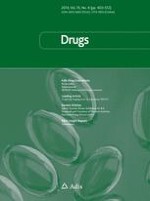Published in:

01-12-2010 | Review Article
Influence of Intensive versus Conventional Glucose Control on Microvascular and Macrovascular Complications in Type 1 and 2 Diabetes Mellitus
Authors:
Taina K. Mattila, Professor Anthonius de Boer
Published in:
Drugs
|
Issue 17/2010
Login to get access
Abstract
In type 1 and 2 diabetes mellitus patients, hyperglycaemia is independently related to the development of microvascular and macrovascular complications. Glycaemic targets and the benefits of intensive versus conventional glucose control are under debate. The purpose of this review is to provide an overview of the randomized controlled trials and meta-analyses comparing the effects of intensive versus conventional glucose control on microvascular and macrovascular complications in type 1 and 2 diabetes.
MEDLINE and Cochrane database searches were performed with a limit on randomized controlled trials or meta-analysis and keywords related to glucose control and diabetes. In addition, related articles and reference lists of relevant articles and guidelines were reviewed.
Nine randomized controlled trials, three in type 1 and six in type 2 diabetes, and four meta-analyses in type 2 diabetes were reviewed. These studies included more than 30 000 patients. On the basis of these trials and metaanalyses, it can be concluded that intensive glucose control has a beneficial effect on microvascular complications (retinopathy, nephropathy, neuropathy) in both type 1 and type 2 diabetes patients. The risk reduction of developing a microvascular complication varied between 25% and 76%. Particularly in patients with type 2 diabetes, there was a 10–15% decrease in nonfatal myocardial infarction with intensive glucose control, but no effect on stroke, cardiovascular death or all-cause mortality was observed. There was a beneficial effect of intensive glucose control on cardiovascular disease in patients with type 1 diabetes in only one trial. In all studies, intensive glucose control was associated with at least twice the risk for serious hypoglycaemia than the conventional-control group.
In conclusion, compared with conventional glucose control, intensive glucose control is associated with fewer microvascular complications in both type 1 and type 2 diabetes, a decrease in coronary events, especially in type 2 diabetes, and more serious hypoglycaemia.